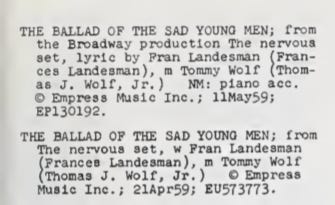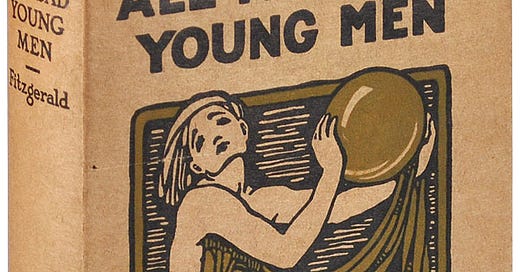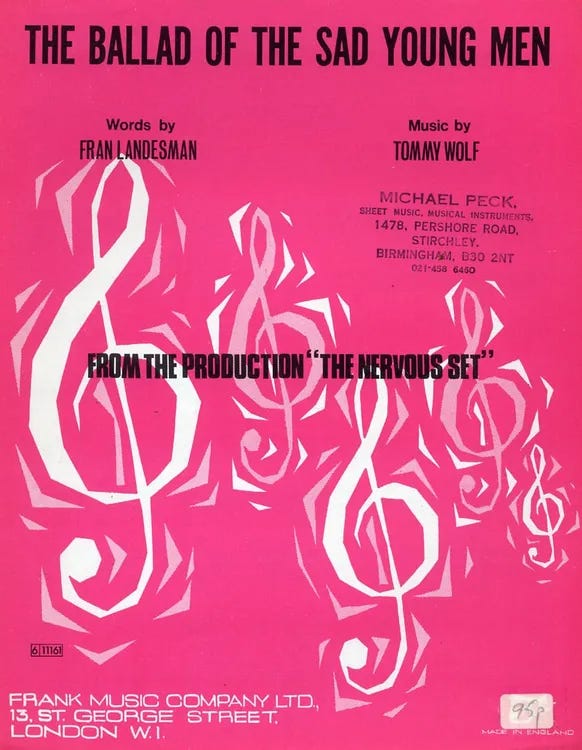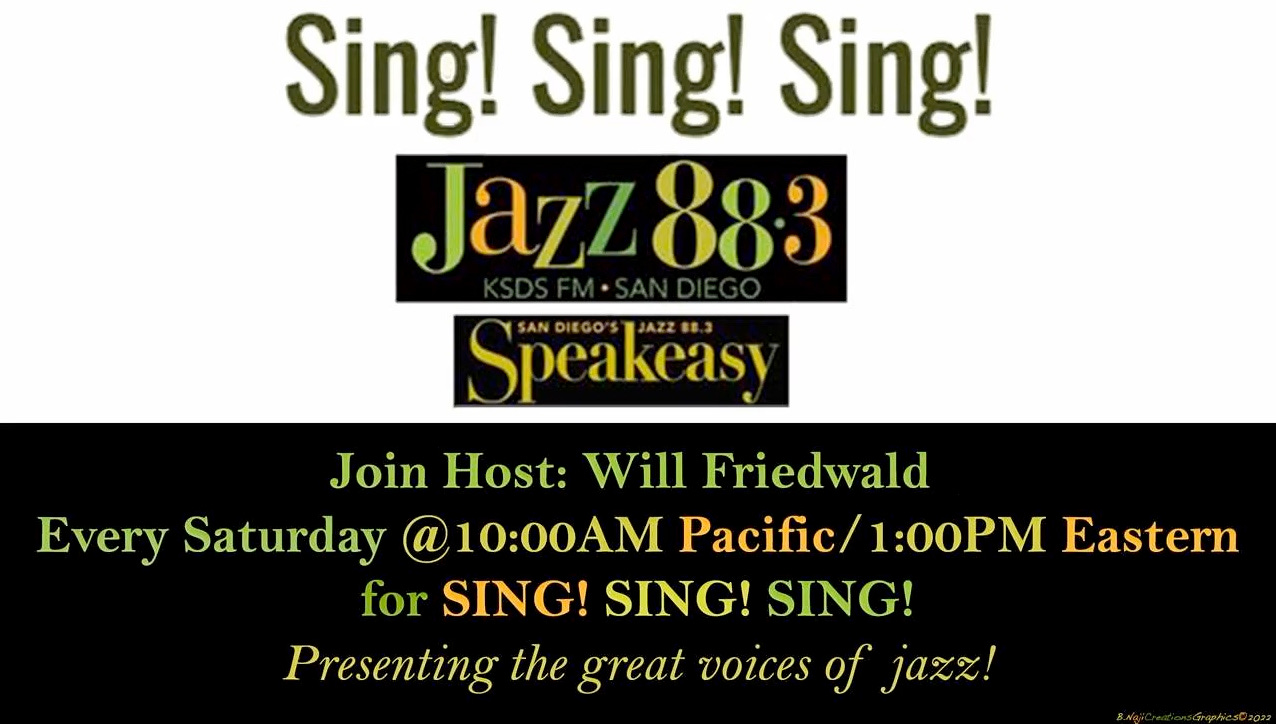A Gil Evans Birthday Special: "Ballad of the Sad Young Men" Part 1
Reasons To Be Nervous, Part 1
I have a few more ELLA FITZGERALD postings to get into, but I thought I would take a detour for this week’s Substack for three reasons:
1 - There’s a great new CD out by Ryan Truesdell and the Gil Evans Project - Shades of Sound (Live at Jazz Standard, Vol. 2) which they are launching at Birdland (I hope to be there on Tuesday - oh wow that’s tonight!) I am also writing a full-length review of this excellent new release for the Wall Street Journal.
2 - This week is Evans’s birthday, and biographer Stephanie Stein Crease is going to celebrate with a special broadcast on WKCR with our buddy, Matthew Fat Cat Rivera. You go, guys!
3- And lastly, I made what is either A.) A fascinating discovery, or B.) I just stumbled across an equally fascinating mistake in the discography.
“Ballad of the Sad Young Men”
(Lyrics by Fran Landesman | Music by Tommy Wolf | Introduced - or so I thought - in the Broadway musical, The Nervous Set, which opened - and closed - in May, 1959.)
At the end of the 1950s, the visionary arranger, composer, and occasional bandleader Gil Evans gave us two classic albums of his brilliant and frequently radical revisions of iconic works from the jazz canon: Old Bottle, New Wine (1958) and Great Jazz Standards (1959), both taped in New York for producer Richard Bock and his World Pacific label.
When most of us first heard Great Jazz Standards, it was many years later, and we never noticed anything unusual - it did, in fact, feature seven truly great jazz standards, including “Joy Spring” by Clifford Brown and “Django” by John Lewis. The major outlier was Evans’s own original, “La Nevada.”
All the tunes on Great Jazz Standards were instrumentals composed by major jazz composers, except for one. “Ballad of the Sad Young Men,” with music by Tommy Wolf, is the only number that was written as a song with lyrics (by Fran Landesman) - which aren’t heard here - and actually conceived as a show tune. I never noticed anything unusual about this being on the album, because by the time I first heard it in the 1980s, “Sad Young Men” was, in fact, an accepted jazz standard that by then had been recorded hundreds of times by instrumentalists as well as singers.
The Evans version was an instant classic, in which the lyrics are essentially sung and the narrative brilliantly communicated in a heartbreakingly sad, expressive trombone solo by Jimmy Cleveland. It was only when listening to the new recording of the Evans arrangement by Ryan Truesdell and the Gil Evans Project that I somehow noticed it was unusual for what was then a brand new song to be included alongside Bix Beiderbecke’s “Davenport Blues” and Don Redman’s “Chant of the Weed.”
In fact, not only was “Ballad of the Sad Young Men” a new song at the time of the album, it may very well be that this session and this album represent its premiere performance and first recording.
Fran Landesman (1927-2011) had been born and raised in New York, although she and her husband Jay were living in St. Louis throughout the 1950s. Apparently they remained closely connected to the artistic and bohemian scene in New York, as they had observed enough of what was going on in Greenwich Village to package these observations into a musical comedy which they titled The Nervous Set. This would come to be regarded as the only Broadway musical - so far - about the Beatnik experience of the 1950s. (That is, unless one counts Nöel Coward’s Sail Away, with its classic tune, “Beatnik Love Affair.”)
The Nervous Set, based on a story by Jay Landesman, with lyrics by Mrs. Landesman and music by Wolf, premiered at the Crystal Palace theater, which had been founded and operated by the Landesmans, Jay, his brother Fred, and Fran, in St. Louis’s Gaslight Square. Opening on March 10, 1959, The Nervous Set was a hit in that very intimate space - hip Missourians must have been fascinated by this tale of beat, offbeat, and neurotic New Yorkers - so much so that the producer Robert Lantz decided to bring it to Broadway.

Alas, after opening at the Henry Miller Theater on May 12, it only ran 23 performances - roughly two weeks - although several latter day observers, including Michael Garber, have speculated that it could have enjoyed a longer run in a much smaller Off-Broadway theater, particularly one actually in Greenwich Village.
Fran Landesman almost certainly knew Gil Evans from her early New York days; she later named one of her two children after Miles Davis. Apparently, while she was living and working on The Nervous Set in St. Louis, she got the “Ballad of the Sad Young Men” to him and, one assumes, gave him permission to be the first to record it. According to Tom Lord’s online Jazz Discography, Evans taped it on February 5, 1959; alternatively, according to Wikipedia, the date was three days earlier, on February 2. Either way, this is well over a month before The Nervous Set opened at the Crystal Palace theater in St. Louis and three months before the Broadway premiere.
Here’s the classic Gil Evans version, with the iconic trombone solo by Jimmy Cleveland:
“Ballad of the Sad Young Men” was born of two sources. The title and the general subject matter of the piece, were directly inspired by F. Scott Fitzgerald and his 1926 book, an anthology of short stories, All The Sad Young Men.
The opening line and the overall format of the song, as our buddy Daniel Weinstein points out, were built on the foundation of the traditional nursery rhyme,
"Sing a song of sixpence / A pocketful of rye."
The song starts with the line,
“Sing a song of sad young men / Glasses full of rye”
and then goes on to follow that format for the rest of the song.
Landesman is working with the irony that in these two very different contexts, “rye” means two very different things. She’s also making rather ironic use of the Mother Goose rhyme in general - to take a rhyme literally from the nursery, the absolute beginning of life, and then spin it into a song about growing old and the loss of innocence.
“Sad Young Men” is very much also in the tradition of jazz-driven extended “art” songs that essentially started with Billy Strayhorn’s “Lush Life” (first recorded by Nat King Cole in 1949) and then continued through Billy Barnes’s “Something Cool” (1953) and Landesman’s own “Spring Can Really Hang You Up the Most,” which she and Wolf wrote in St. Louis in 1955. You might also see it in the context of the nascent folk boom of the period, in which traditional songs like “Black is the Color of My True Love’s Hair” were repurposed and turned into, essentially jazz / theater / art songs - a kind of beatnik lieder. “Sad Young Men” is all these things.
Daniel notes, “The music of the song itself has classical/gospel/folk harmonies, i.e. mostly triadic with little or no jazz harmonic extensions. This is right in Roberta Flack's wheelhouse, similar to ‘The First Time Ever I Saw Your Face’ and ‘Killing Me Softly.’” With its folk-like qualities, it’s no surprise that it became a cornerstone of the career of Roberta Flack, who would have major hits with songs by modern folk songwriters like Ewan MacColl.
Before we go any further, here’s the original cast performance, by Tani Seitz (listed as “Toni Seitz” in wiki) on the original cast album for The Nervous Set:
And here’s the excellent new version by Ryan Truesdell, recorded in 2014 at the old Jazz Standard (an appropriate place to celebrate an album titled Great Jazz Standards) but just being released this month. Ryan Keberle takes the trombone solo, and the late pianist Frank Kimbrough is also briefly heard.
The text:
Sing a song of sad young men, glasses full of rye.
All the news is bad again, kiss your dreams goodbye.
All the sad young men, sitting in the bars,
Knowing neon nights, and missing all the stars.
All the sad young men, drifting through the town,
Drinking up the night, trying not to drown.
All the sad young men, singing in the cold,
Trying to forget, that they're growing old.
All the sad young men, choking on their youth,
Trying to be brave, running from the truth.Autumn turns the leaves to gold, slowly dies the heart
Sad young men are growing old, that's the cruellest part.
All the sad young men, seek a certain smile,
Someone they can hold, for just a little while.
Tired little girl, does the best she can,
Trying to be gay, for a sad young man,
While a grimy moon, watches from above,
All the sad young men, play at making love.
Misbegotten moon shine for sad young men,
Let your gentle light guide them home again.
All the sad, sad, sad, young men.
COMING IN PART TWO - MORE REMARKABLE & EXCEPTIONAL PERFORMANCES OF “BALLAD OF THE SAD YOUNG MEN” (incuding a personal memoir of the song as performed by the late Annie Ross).
PS: Highly Recommended: The best-ever Ella Fitzgerald Discography, as compiled by the late Michele Scasso with considerable help and input from the mighty Steve Albin. Accessible here!
Coming soon:
Ella at the Movies
(Very special thanks to Elizabeth Zimmer & Dan Fortune for their expert proofing, hey!)
Coming on Wednesday May 21 @ 7:00PM, THE NEW YORK ADVENTURE CLUB presents THE RAT PACK: A LEGENDARY ENSEMBLE (All presentations are available for replay viewing for one week after the live event. For more information & reservations, please click here.)
Sing! Sing! Sing! : My tagline is, “Celebrating the great jazz - and jazz-adjacent - singers, as well as the composers, lyricists, arrangers, soloists, and sidemen, who help to make them great.”
A production of KSDS heard Saturdays at 10:00 AM Pacific; 1:00 PM Eastern.
To listen to KSDS via the internet (current and recent shows are available for streaming) click here.
The whole series is also listenable on Podbean.com; click here.
SING! SING! SING!
Cinco de Mayo 2025 - Swinging Singers Go Latin!
(SSS #147 2025-05-10)
download: <or> play online:
The Bing Crosby Birthday Special - Call of the South
SSS #146 2025-05-03.
Download: <or> play online:
In the Garden with Duke Ellington & Billy Strayhorn
(SSS #145 2025-04-26 Spring Show #1)
Download: <or> play online:
Pop! Goes The Ella - Ella Fitzgerald Sings the Great Hits of Today
(SSS #144 2025-03-19)
download: <or> play online:
Religion In Rhythm - Book 3
(SSS #143 2025-04-12)
download: <or> play online:
April Fool's Day Special - Great Jazz Novelty Songs
(SSS #142 2025-04-05)
Download: <or> play online:
Female Songwriters of the Swing Era part 2 w Professor Michael G. Garber
(SSS #141 2025-03-29 Women's History Month)
download: <or> play online:
Female Songwriters of the Swing Era Part 1 w Professor Michael G. Garber
(SSS #140 2025-03-22 Women's History Month)
download: <or> play online:
The NAT KING COLE birthday Special - Nat & Nelson swing the Standards
(SSS #139 2025-03-15)
download: <or> play online:
Ella Fitzgerald: "Ella's Race Problem" with Judith Tick
(BLACK HISTORY MONTH 2025-02-24)
download: <or> play online:
Nat King Cole: "We Are Americans Too" (“Assault on a King”)
(BLACK HISTORY MONTH 2025-02-18)
Download: <or> play online:
THE REAL AMBASSADORS with special guest Ricky Riccardi
(Black History Month 2025-02-17)
download: <or> play online:
SLOUCHING TOWARDS BIRDLAND is a Substack newsletter by Will Friedwald. The best way to support my work is with a paid subscription, for which I am asking either $5 a month or $50 per year. Thank you for considering. (Thanks as always to Beth Naji & Arlen Schumer for special graphics.) Word up, peace out, go forth and sin no more! (And always remember: “A man is born, but he’s no good no how, without a song.”)
Note to friends: a lot of you respond to my Substack posts here directly to me via eMail. It’s actually a lot more beneficial to me if you go to the Substack web page and put your responses down as a “comment.” This helps me “drive traffic” and all that other social media stuff. If you look a tiny bit down from this text, you will see three buttons, one of which is “comment.” Just hit that one, hey. Thanks!j
Slouching Towards Birdland (Will Friedwald's Substack) is a reader-supported publication. To receive new posts and support my work, consider becoming a free or paid subscriber.








Will: Glad to see you are still out there. Enjoy myself reading you. - George Kanzler
I’d have loved to read a discussion of Mabel Mercer’s version along with the ones here. It’s hard to find online but it’s probably my favorite, in some part because it’s how I first heard the song.